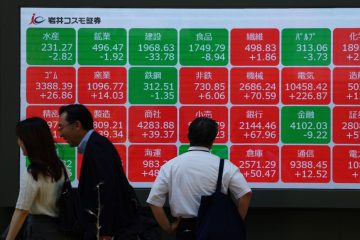AI cooling has become a lucrative investment in the stock market

Artificial intelligence is currently in high demand and widely discussed. The rapid expansion of artificial intelligence (AI) has resulted in a significant increase in energy consumption in data centers, as well as the generation of excessive heat. This has created opportunities for companies who offer cooling systems for servers.
The International Energy Agency predicts that electricity usage in U.S. data centers would increase by approximately 30% between 2022 and 2026, reaching a total of 260 terawatt-hours. This accounts for around 6% of the country’s total electrical demand, which is equivalent to the amount needed to supply electricity to 24 million American households for one year. The majority of that energy will disperse as heat, resulting in an increased demand for cooling systems.
Vertiv Holdings, headquartered in Ohio, is a firm that specializes in supplying power and cooling solutions for data centers. The company’s stock has had a significant increase of around 700% since the conclusion of 2022. Vertiv experienced a significant 60% growth in orders compared to the same period last year, without taking into account the effects of foreign exchange. As a result, there was a significant increase in the order backlog, reaching a record-breaking amount of $6.3 billion at the end of March. Approximately one-third of the company’s sales were derived from providing thermal control solutions for data centers.
Presently, the majority of data centers employ fans to facilitate the circulation of air in order to maintain lower temperatures. However, processors with greater power and thus higher temperatures will push the boundaries of conventional air cooling systems. An effective method to address this issue is to circulate a liquid coolant through the servers via pipes in order to dissipate heat. Liquids possess a greater heat capacity and facilitate faster heat transfer. Water requires over 3,000 times more heat than air, per unit volume, to increase its temperature by one degree. Data centers can achieve higher server density by implementing more efficient cooling solutions.
According to Goldman Sachs, the market for cooling servers is projected to grow from $4.1 billion this year to $10.6 billion in 2026. According to the bank’s estimate, the use of liquid cooling in the AI server market is expected to increase in popularity. The penetration rate of liquid cooling is projected to reach 57% by 2026, compared to 23% this year. This would result in improved profit margins for cooling system providers due to the intricate design of these systems. According to J.P. Morgan, liquid cooling systems are priced at three to four times the cost of air cooling systems.
Similar to the performance of Vertiv, a U.S.-based company, the shares of Asian manufacturers that produce components for cooling systems have also experienced a significant increase. The stock prices of Taiwan’s Asia Vital Components (AVC) have increased by 600% since the conclusion of 2022, while Auras Technology, another Taiwanese company, has had a 510% gain. Both companies are increasing their manufacturing capacity in order to fulfill the growing demand. Vertiv acquired CoolTera in December in order to enhance its liquid cooling technology.
Given the significant investments made by technology giants such as Microsoft and Meta in AI data centers, it is natural for there to be excitement surrounding the cooling technology stocks. However, their stocks are currently being traded at a valuation of over 40 times the projected earnings, as reported by FactSet. This is in contrast to the previous multiples below 20 during the AI craze. The current valuation of the embryonic industry already reflects a significant amount of anticipated development, notwithstanding the challenges in accurately predicting its future.
Participating in the AI gold rush by selling tools and equipment has shown to be a profitable investment, however, it is crucial for investors to remain calm and rational.










